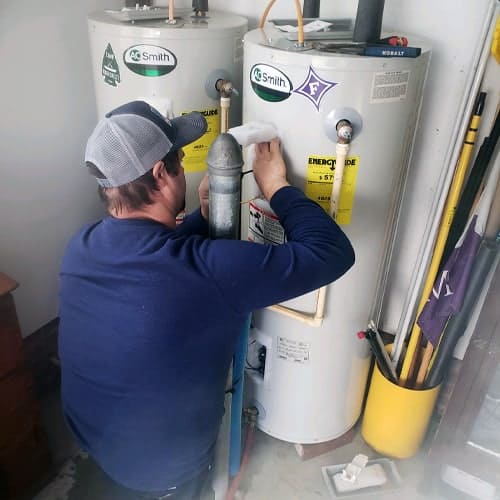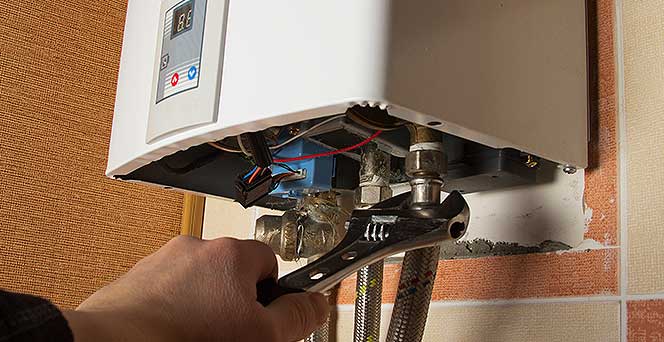They are making a number of good annotation about Water Heater Burst overall in the content below.

Whether it is located in the cellar or a different room, busted water heaters can cause anxiety. A common unit holds 80 gallons, so an over night leak will certainly lead to a flooding. This causes major residential or commercial property damages with soaked walls and also floors. Besides, having no hot water supply is additionally problematic. If you are taking care of these issues, keep in mind of the following:
Call the Plumber
After doing the initial two security steps, you need to call your plumber to come right away to repair a fractured water heater. There are normally indicators that your aging water heater has sediment build-up in the interior.
Don't wait on significant flooding to call the plumber. Already, you will certainly need to spend more to recover your building. Instead, as quickly as you detect these indicators, have a professional come to check your hot water heater tank. Typically, water heaters have a life expectancy of regarding 8 to 12 years. With regular assessment and also upkeep, you can extend its life.
Cut Off the Cold Water Supply
Cut off the containers tap water supply from the resource. This goes from your major water line right into the storage tank. When your container is in good condition, the cold water stops filling up when the storage tank is complete. Since it is leaking, the water will continue to stream. Close the shutoff located at the top of the heating unit. Rotate this clockwise to shut it off. You must transform off that major water supply line outside your property if you can not find it or reach it.
Shut Down Source Of Power
Prior to calling the plumber, turned off a gas hot water heater by turning the temperature dial. This is usually found on top of the thermostat. Switch over off the circuit breaker if you have a model that runs on electric power. This will certainly avoid electrocution, especially if there is a leakage as water is a conductor. Usually, the heating element shuts off when the water hits a certain temperature. With a busted tank, it may malfunction. Sufficing off assures you stay safe.
Tidy up Residential property
After calling the plumber, file damage by remembering and pictures so you can declare your house owner's insurance. From there, start the immediate cleanup. Secure any kind of essential items to stop more saturating. Get rid of any type of standing water to prevent mold and mold development. Utilize that to drain pipes the water if you have a submersible water pump. Otherwise, the conventional container method will likewise function. Attempt to wipe out whatever, including walls and walls. If you have an electrical fan and dehumidifier, maintain them going to maintain air distributing. This will certainly assist deter mold and mildew growth.
Bear in mind, if you notice any kind of concerns with your water heater, call the pros immediately. You can not take this issue lightly since a defective thermostat can elevate water temperature to an alarmingly high degree, resulting in accidental burns. A damaged heater pressure relief valve can likewise cause an explosion. For finest results, obtain an annual check so your system gets checked, cleaned up, drained, as well as re-filled, ensuring optimum performance.
After doing the very first 2 security steps, you have to call your plumber to come right away to deal with a ruptured water heater. Instead, as soon as you identify these signs, have a professional come to check your water heating unit container. Prior to calling the plumber, shut off a gas water heater by turning the temperature dial. If you have a submersible water pump, make use of that to drain the water. Bear in mind, if you observe any kind of problems with your water heater, call the pros right away.
8 REASONS YOUR HOT WATER HEATER IS NOT WORKING & HOW TO FIX
Water Heater Problems & Solutions
Loose or Damaged In-Line Valve
Unlike a water leak near the bottom of your water tank, a water leak on top of your system can be easily fixed. A common cause of water tank leaks includes a loose in-line valve. This is a handle that is located at the top of the water tank that is engineered to activate or deactivate the flow of water. To fix this problem, you will need to secure the nut that holds the ball or in-line valve in its location. If the leak becomes more severe once it is tightened, you will be required to travel to your local hardware store to purchase a new in-line valve for your water heater.
Damaged Pressure Relief Valve
Most types of water heaters are equipped with a pressure relief valve that is engineered to discharge pressure from the water tank when it becomes too high. If this valve on top of your water heater begins to leak, we recommend purchasing a new one online or from your local store. The process of removing and replacing pressure relief valves is not complicated.
No Warm Water
If you have an electric water heater in your home, the most typical cause of a lack of warm water is a broken heating element. Your water heater is equipped with two heating elements that are tasked with heating incoming water in the water tank. Once a heating element begins to malfunction, you will have little to no hot water to use for showering, cleaning, and laundry.
Low Supply of Hot Water
Are you continuously running out of warm water? This issue may be a byproduct of a cracked dip tube. This tube is engineered to push cold water to the base of your water tank to be heated. Once a crack or hole begins to form in the dip tube, the incoming supply of cold water may be released near the top or middle of your tank. As a result, the cold water on top of the tank will be sent to the faucets and showers in your house. This hot water heater problem can only be fixed by replacing the dip tube on your system. Since the process of installing a new dip tube is complex, we recommend calling a certified technician for help.
A low supply of warm water may also be a signal of excess sediment buildup in your water tank. As your water heater reaches the middle of its life cycle, minerals in water including magnesium and calcium will begin to collect at the base of the water tank. As the minerals continue to grow, there will be less room in the water tank to store hot water. To resolve this problem, flush your water heater to remove the excess minerals.
Water is Too Warm or Cold
If the water in your shower feels uncomfortable hot or cold, you can adjust the temperature of your water by changing the settings on your thermostat. Setting the temperature to 120 degrees Fahrenheit may help you save money on your utility bills. This is an excellent temperature to use if you’re worried about scalding or skin irritation. Does this temperature feel too cold? You may also adjust the thermostat to 140 degrees Fahrenheit to make your showers more pleasant. If your hot water heater is not working when you change the temperature, this is an indicator of a broken thermostat. Immediately find a certified plumbing or heating contractor in your area to repair or replace your thermostat.
Low Water Pressure
Low water pressure is not always caused by a malfunctioning water heater. If you live in an older home with smaller water pipes, the flow of water will be restricted prior to reaching our kitchen or bathroom skins. The only way to eliminate this hot water heater problem is to connect new ¾-inch water lines to your system. Another type of problem that may negatively impact your water pressure includes calcium deposits in water pipes.
As magnesium and calcium begin to form in your pipes, the diameter of your water lines will become smaller. As a result, the warm water from your water heater will not be able to travel in an efficient manner to your sinks or appliances. Since the process of replacing water pipes includes removing drywall, an average homeowner that does not have a plumbing license will not be able to fix this hot water heater problem.
https://www.wmhendersoninc.com/blog/8-reasons-your-water-heater-is-not-working-how-to-fix/

We were introduced to that article about Water Heater Repair through a good friend on a different web page. Enjoyed our write up? Please share it. Let others locate it. Thanks a bunch for your time. Visit us again soon.
Dial, we're waiting!